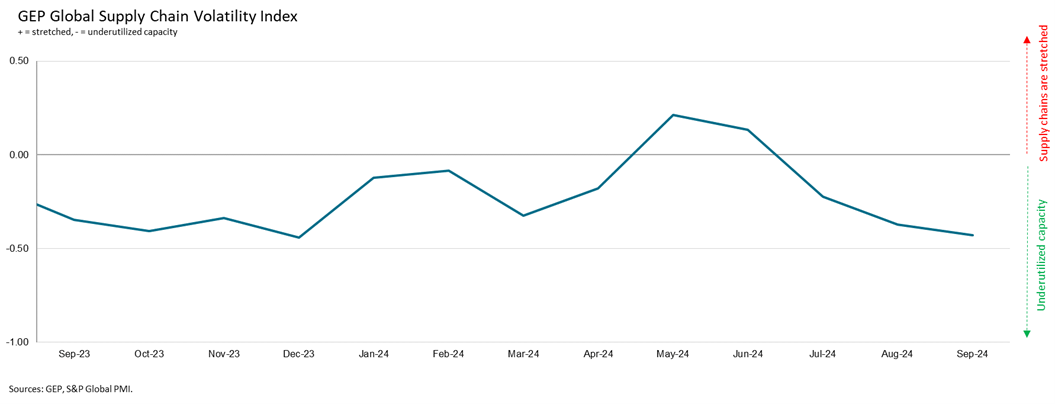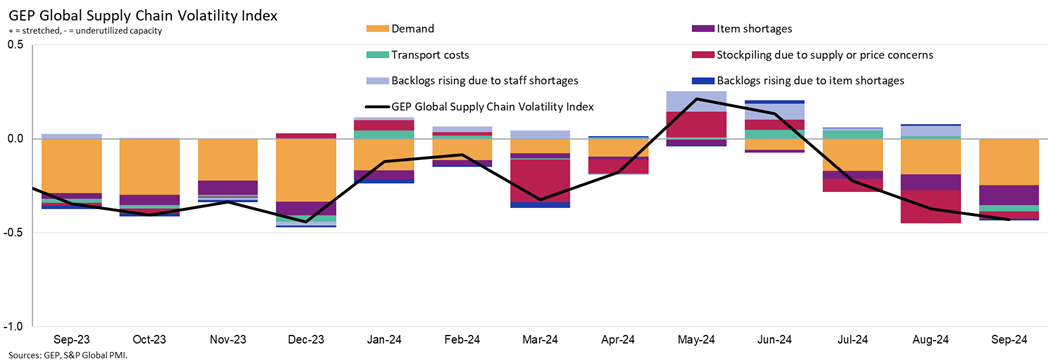-
GEP Software
-
- Procurement Software
- Direct Procurement Software
- Indirect Procurement Software
- Unified Source-to-Pay
- Source-To-Contract Software
- Procure-to-Pay
- Midsize & High Growth Enterprises
- Key Capabilities
- Spend Analysis
- Sourcing
- Contract Lifecycle Management
- Supplier Lifecycle Management
- Third-Party Risk Management
- Purchasing
- Payments
- Data Analytics and Reporting
- Do more with GEP SMART
- Intake Management & Orchestration
- Intelligent Category Management
- Tail Spend Management
- Cost Data & Analytics (GEP COSTDRIVERS)
- AI-First Supply Chain Management
- Supply Chain Visibility and Execution
- Logistics Visibility
- Inventory and Warehouse Management
- GEP Multienterprise Collaboration Network
- Supply Chain Control Tower
- Field Services
- Supply Chain Collaboration & Planning
- Supply Chain Planning
- Purchase Order Collaboration
- Forecast Collaboration
- Capacity Collaboration
- Quality Management Software
- Should-Cost Modeling
- Direct Material Sourcing
-
-
GEP Strategy
-
GEP Strategy
Unrivaled supply chain and procurement expertise + the transformative power of AI
Supply Chain Consulting
- Environmental, Social and Governance
- Sustainability Consulting Services
- Socially Responsible Sourcing
- Scope 3
- Demand and Supply Chain Planning
- Collaborative Planning
- Source To Contract
- Procure To Pay
- Inventory Strategy & Management
- Operations & Manufacturing Excellence
- GEP Total Inventory Management Solution
- Network Strategy & Optimization
- Warehousing & Transportation Management
-
-
GEP Managed Services
-
GEP Managed Services
World-class skills, experience and know-how — amplified by the power of AI
-
- North America factory purchasing activity deteriorates more quickly in September, with demand at its weakest year-to-date, signaling a quickly slowing U.S. economy
- Factory procurement activity in China fell for a third straight month, and devastation from Typhoon Yagi hit vendors feeding Southeast Asian markets like Vietnam
- Europe’s industrial recession deepens, leading to an even larger increase in supplier spare capacity
Clark, N.J., Oct. 11, 2024 – The GEP Global Supply Chain Volatility Index — a leading indicator tracking demand conditions, shortages, transportation costs, inventories and backlogs based on a monthly survey of 27,000 businesses — decreased in September to -0.43 (August: -0.37), its lowest level in 14 months and indicating the greatest level of global supply chain spare capacity since July 2023.
The rise in underutilized vendor capacity was driven by a further deterioration in global demand. Factory purchasing activity was at its weakest in the year-to-date, with procurement trends in all major continents worsening in September and signaling gloomier prospects for economies heading into Q4.
Notably, supplier spare capacity shot up again in North America. U.S. manufacturers lowered their purchasing volumes aggressively in September, with a slowing of the U.S. economy denting factory orders.
In Asia, supply chain spare capacity also rose to a year-to-date high. Slowing economic conditions in other parts of the globe led factory procurement activity in China to fall for a third straight month in September. There was also the devastating impact of Typhoon Yagi across Southeast Asia. Vietnam was affected in particular, causing vendors supplying this part of the region to suffer as a result.
Europe’s industrial recession intensified, reflecting the blight of major manufacturers in the continent due to macro factors like competitive pressures from China, high energy costs and a flagging eurozone economy.
“September is the fourth straight month of declining demand and the third month running that the world’s supply chains have spare capacity, as manufacturing becomes an increasing drag on the major economies,” explained Jagadish Turimella, chief operating officer and co-founder, GEP. “With the potential of a widening war in the Middle East impacting oil, and the possibility of more tariffs and trade barriers in the new year, manufacturers should prioritize agility and resilience in their procurement and supply chains.”

Interpreting the data:
- Index > 0, supply chain capacity is being stretched. The further above 0, the more stretched supply chains are.
- Index < 0, supply chain capacity is being underutilized. The further below 0, the more underutilized supply chains are.

SEPTEMBER 2024 KEY FINDINGS
- DEMAND:Global demand for raw materials, commodities and other intermediate goods deteriorated more quickly in September, reflecting a stronger downturn in procurement activity across many major global economies, such as the U.S., China and Germany.
- INVENTORIES: In September, reports of stockpiling due to price or supply concerns remained below the long-term average.
- MATERIAL SHORTAGES: The item shortages indicator fell to its lowest level since January 2020, indicating improved global raw material availability as factories retrench.
- LABOR SHORTAGES: Reports of staff shortages leading to a rise in backlogs at manufacturers were in line with historically typical levels in September. This indicates that labor supply is generally capable of meeting demand.
- TRANSPORTATION: Global transportation costs once again dipped in September and were the lowest since July 2023.
REGIONAL SUPPLY CHAIN VOLATILITY
- NORTH AMERICA: Index fell to a 15-month low of -0.78, from -0.62, signaling a further increase in spare vendor capacity. The U.S. market drove this, with the economy slowing ahead of the presidential election.
- EUROPE: Index fell to a nine-month low of -0.74, from -0.53, indicating a further intensification of the continent’s industrial downturn. Germany continues to pull other parts of the region down with it.
- U.K.: Index fractionally rose to -0.12, from -0.14. The U.K. is demonstrating some resilience to wider global economic headwinds — partly reflecting an ongoing post-election bounce.
- ASIA: Index at a year-to-date low of -0.36, down from -0.07, signalling the highest level of spare vendor capacity since December 2023. In addition to a slowing Chinese market, Typhoon Yagi dented supplier activity in Southeast Asia.
For more information, visit www.gep.com/volatility
Note: Full historical data dating back to January 2005 is available for subscription. Please contact economics@spglobal.com.
The next release of the GEP Global Supply Chain Volatility Index will be 8 a.m. ET, Nov. 12, 2024.
About the GEP Global Supply Chain Volatility Index
The GEP Global Supply Chain Volatility Index is produced by S&P Global and GEP. It is derived from S&P Global’s PMI® surveys, sent to companies in over 40 countries, totaling around 27,000 companies. The headline figure is a weighted sum of six sub-indices derived from PMI data, PMI Comments Trackers and PMI Commodity Price & Supply Indicators compiled by S&P Global.
- A value above 0 indicates that supply chain capacity is being stretched and supply chain volatility is increasing. The further above 0, the greater the extent to which capacity is being stretched.
- A value below 0 indicates that supply chain capacity is being underutilized, reducing supply chain volatility. The further below 0, the greater the extent to which capacity is being underutilized.
A Supply Chain Volatility Index is also published at a regional level for Europe, Asia, North America and the U.K. For more information about the methodology, click here.
About GEP
GEP® delivers AI-powered procurement and supply chain solutions that help global enterprises become more agile and resilient, operate more efficiently and effectively, gain competitive advantage, boost profitability and increase shareholder value. Fresh thinking, innovative products, unrivaled domain expertise, smart, passionate people — this is how GEP SOFTWARE™, GEP STRATEGY™ and GEP MANAGED SERVICES™ together deliver procurement and supply chain solutions of unprecedented scale, power and effectiveness. Our customers are the world’s best companies, including more than 1,000 Fortune 500 and Global 2000 industry leaders who rely on GEP to meet ambitious strategic, financial and operational goals. A leader in multiple Gartner Magic Quadrants, GEP’s cloud-native software and digital business platforms consistently win awards and recognition from industry analysts, research firms and media outlets, including Gartner, Forrester, IDC, ISG, and Spend Matters. GEP is also regularly ranked a top procurement and supply chain consulting and strategy firm, and a leading managed services provider by ALM, Everest Group, NelsonHall, IDC, ISG and HFS, among others. Headquartered in Clark, New Jersey, GEP has offices and operations centers across Europe, Asia, Africa and the Americas. To learn more, visit www.gep.com.
About S&P Global
S&P Global (NYSE: SPGI) S&P Global provides essential intelligence. We enable governments, businesses and individuals with the right data, expertise and connected technology so that they can make decisions with conviction. From helping our customers assess new investments to guiding them through ESG and energy transition across supply chains, we unlock new opportunities, solve challenges and accelerate progress for the world. We are widely sought after by many of the world’s leading organizations to provide credit ratings, benchmarks, analytics and workflow solutions in the global capital, commodity and automotive markets. With every one of our offerings, we help the world’s leading organizations plan for tomorrow, today.
Media Contacts
| Derek Creevey Director, Public Relations GEP Phone: +1 732-382-6565 Email: derek.creevey@gep.com | Joe Hayes Principal Economist S&P Global Market Intelligence Phone: +44-1344-328-099 Email: joe.hayes@spglobal.com | S&P Global Market Intelligence Email: Press.mi@spglobal.com |
Disclaimer
The intellectual property rights to the data provided herein are owned by or licensed to S&P Global and/or its affiliates. Any unauthorised use, including but not limited to copying, distributing, transmitting or otherwise of any data appearing is not permitted without S&P Global’s prior consent. S&P Global shall not have any liability, duty or obligation for or relating to the content or information (“Data”) contained herein, any errors, inaccuracies, omissions or delays in the Data, or for any actions taken in reliance thereon. In no event shall S&P Global be liable for any special, incidental, or consequential damages, arising out of the use of the Data. Purchasing Managers’ Index™ and PMI® are either trade marks or registered trade marks of S&P Global Inc or licensed to S&P Global Inc and/or its affiliates.
This Content was published by S&P Global Market Intelligence and not by S&P Global Ratings, which is a separately managed division of S&P Global. Reproduction of any information, data or material, including ratings (“Content”) in any form is prohibited except with the prior written permission of the relevant party. Such party, its affiliates and suppliers (“Content Providers”) do not guarantee the accuracy, adequacy, completeness, timeliness or availability of any Content and are not responsible for any errors or omissions (negligent or otherwise), regardless of the cause, or for the results obtained from the use of such Content. In no event shall Content Providers be liable for any damages, costs, expenses, legal fees, or losses (including lost income or lost profit and opportunity costs) in connection with any use of the Content.
Media contact

Breadcrumb
- HOME
- NEWS AND UPDATES
- SUPPLY CHAIN SPARE CAPACITY INCREASES FOR 3RD CONSECUTIVE MONTH AND NOW AT HIGHEST LEVEL SINCE JULY 2023 AS GLOBAL ECONOMIC WEAKNESS INTENSIFIES: GEP GLOBAL SUPPLY CHAIN VOLATILITY INDEX









